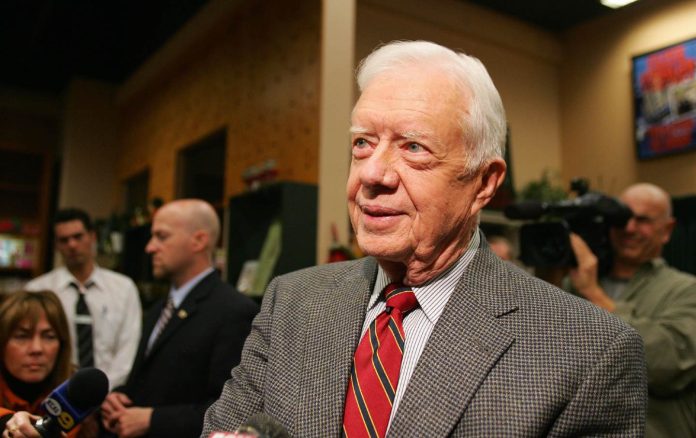Former president Jimmy Carter has died at the age of 100. After leaving office in 1981, he enjoyed by far the longest retirement of any president in history—just over 42 years.
Recent tributes have invariably described Carter as a decent, dedicated public servant; a longtime Sunday school teacher who built homes with Habitat for Humanity. A humble man who lived modestly and who, unlike his successors, did not enrich himself
But this narrative belies the quietly radical approach Carter took to the post-presidency. By fiercely advocating for peace, and playing an active and transpartisan role in international diplomacy, Carter set a venerable standard for how politicians can serve the public long after leaving office. He did more to advocate for peace as an ex-president than most politicians do in the entirety of their careers.
President Carter and his wife, Rosalynn, founded the Carter Center in 1982, with an explicit mission to alleviate human suffering. The Center “wages peace” by resolving global conflicts, advancing human rights, and monitoring over 100 elections in almost 40 countries. The Nobel Committee cited these efforts as a reason for making Carter the first ex-US president to win the Nobel Peace Prize. (Other presidents have received the prize, but all while in office.)
His commitment to peace has made Carter a go-to envoy to North Korea for decades. In 1994, he and Rosalynn were the first people to cross the demilitarized zonesince the Korean War—and President Carter engaged in talks with President Kim that defused then-intensifying nuclear tensions. He went again in 2010, on behalf of the Obama administration, to secure the release of an American prisoner, after North Korea specifically requested his presence. He even offered to represent the Trump administration, though, needless to say, they didn’t take him up on it.
Popular
“swipe left below to view more authors”Swipe →
In 2007, he cofounded The Elders, a group of statesmen committed to world peace and human rights, alongside former Irish president Mary Robinson, Archbishop Desmond Tutu, and former South African president Nelson Mandela. Carter played a key role in the group’s inaugural trip to Sudan to bring attention to the war in Darfur. He later led delegations to Israel and Palestine in support of a two-state solution, and in 2015 met with President Vladimir Putin in Russia to discuss, among other topics, the conflict in Ukraine.
Carter took positions few American elected officials would dare to take, let alone former presidents. In his 2006 book, Palestine: Peace Not Apartheid, he charged Israel with human rights abuses in occupied Palestinian territory. The book generated outrage—he faced accusations of antisemitism, condemnation fro
Carter had no qualms about criticizing his successors, either.






